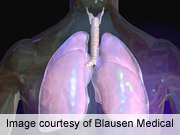(HealthDay)—Those born prematurely continue to have abnormal ventilatory responses to hypoxia and hyperoxia as adults, which may have clinical consequences such as sleep disorders, according to a study published in the Feb. 6 issue of the New England Journal of Medicine.
Melissa L. Bates, Ph.D., from the University of Wisconsin in Madison, and colleagues measured the ventilatory responses to five minutes of hypoxia (fraction of inspired oxygen of 0.12) and hyperoxia (fraction of inspired oxygen of 1.0) in 13 adults born prematurely, as well as in age-matched adults born at full term.
The researchers found that, although the two groups had similar pulmonary function and exercise capacity, the preterm adults had a significantly reduced hypoxic ventilatory response and two preterm adults hypoventilated. Sixty seconds of hyperoxia induced respiratory depression in only eight preterm adults compared with all full-term adults. Preterm adults also had a significantly lower mean response to hyperoxia (−3.0 versus −29.6 percent).
"We speculate that these underappreciated abnormalities in ventilatory control may have important clinical consequences, including an increased risk of disordered breathing during sleep and in response to high altitude and anesthesia," Bates and colleagues write.
More information: Full Text
Journal information: New England Journal of Medicine
Copyright © 2014 HealthDay. All rights reserved.





















